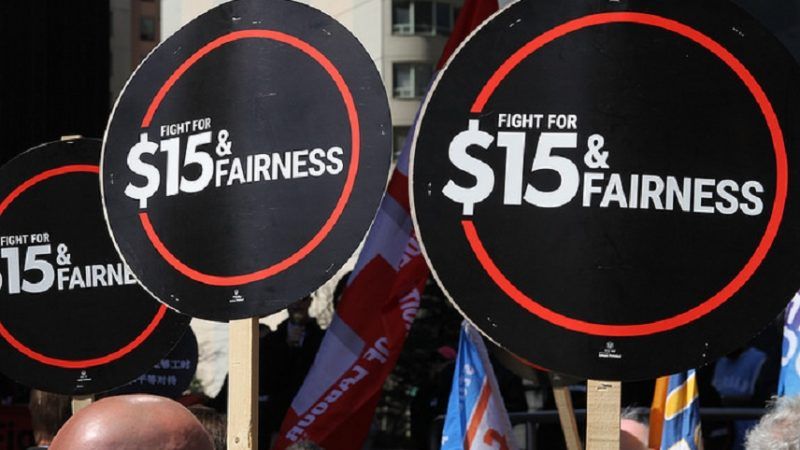Minimum Wage Hikes Inflict Maximum Pain
Hiking the minimum wage is feel-good humanitarian idea that's guaranteed to hurt actual humans.

There's probably no more popular way of patting yourself on the back for doing good while actually harming people than advocating for hiked minimum wage laws that forbid people to accept work that pays below a legally mandated floor.
When you raise the price of something above what people are willing to pay, people buy less of it, or else they pass the costs down the line, when possible. This isn't exactly a revelation; it's one of the older known economic realities. Unfortunately, there's always been a certain portion of the population that insists that labor is different and that you really can make people more prosperous by decree. But yet more recent evidence suggests that hiking the price of hiring people works just like raising the cost of everything else. This means that the recent craze for minimum wage laws has not turned out, after all, to be a genius plan for filling bank accounts.
At the beginning of this year, the Subway sandwich chain announced a $5.00 foot-long promotion at its stores—well, at a lot of its stores. Not participating is David Jones, a Seattle franchisee, who posted a sign saying that he couldn't offer the much-advertised deal because "The cost of doing business in the City of Seattle is very high. We are balancing the Highest Minimum Wage in the Nation, Paid Sick Leave, ACA, Secure Scheduling, Soda Tax and much more." Instead, he offered coupons that lowered the price of sandwiches—but not to the extent of the $5.00 deal.
The Secure Scheduling and Paid Sick Leave referenced in that sign are also expensive labor mandates in Seattle, in addition to the city's graduated hike to a $15.00 per hour minimum wage. In addition, the city whacks its residents with a 1.75 cent per ounce tax on sugary drinks that further raises the price of a quick meal.
So a Seattle Subway franchise necessarily charges customers more for their food and drink than they'd pay elsewhere. That is, it charges more from customers willing to make the purchase. More expensive sandwiches may mean fewer buyers. That could result in fewer jobs at Subway franchises—and at other businesses affected by the same laws.
In fact, employers in Seattle seem to be employing fewer people as a result of the minimum wage hike, and paying the people they hire for fewer hours worked. As a result, despite stepped increases in mandated hourly wages, "total payroll fell for such jobs, implying that the minimum wage ordinance lowered low-wage employees' earnings by an average of $125 per month in 2016," according to University of Washington researchers. (Flustered Seattle officials responded to the study by commissioning another paper from a socialist economics professor at UC-Berkeley who always finds that minimum wage hikes are beneficial.)
So the sharply increased minimum wage has resulted in slimmer paychecks for many of the people it was supposed to benefit.
But slimmer paychecks can turn into no paychecks if employers decide that it's not worth hiring people at artificially inflated prices when there are other ways to get tasks done. With 18 states and 20 cities hiking minimum wages at the beginning of this year, casual-dining hamburger chain Red Robin announced last week that it's eliminating busboys at all of its 570 locations, after having already dumped its expediters.
"We need to do that to address the labor increases we've seen," chief financial officer Guy Constant told attendees at a retail conference.
That doesn't leave many people still employed by the chain to take orders, prepare food, plate it, serve it, and clear tables—a point some industry critics are pointing to as a potential pitfall.
But if you're familiar with the mostly western chain, you know that it's one of the many casual dining restaurants that use tabletop tablets for ordering drinks, dessert, and paying your bill with a credit card. I don't remember which brand Red Robin uses, but when I first encountered Ziosk's version of these widgets a few years ago, the device was so obviously poised to take over ordering and payment functions that the Chili's chain felt obliged to publicly swear that no server jobs were at risk because "we'd never want to lose our awesome Team Members."
Uh huh.
"The biggest fear is that eventually the Ziosk will take over the job entirely," NPR reported in 2015. "Uno [Pizzeria] denies this; so did all of the chains I talked to. They said they are not firing servers and the Ziosks are there to help them, not replace them. But restaurants are doing more business without hiring more workers."
NPR also discovered that people spend more when they order through tablets then when they order from people—especially on dessert. Apparently, diners feel a little reticent about going full calory-count under the gaze of fellow humans, but have no qualms about indulging when dealing with robots.
So, replacing expensive human servers with cheap computers results in lower labor costs and higher expenditures by customers? Look for dining at Red Robin and its casual counterparts to become a barely-touched-by-human-hands process in the near future. An actual human server earning a paycheck may increasingly become part of the white-tablecloth experience, with prices to match.
And why should this be a shock? Is it really surprising that if you artificially demand premium prices for labor, that labor becomes a premium offering available only to those willing to pay extra for the experience?
In the years to come, don't count on fast-food sandwiches costing any less in Seattle, and don't be surprised if you have to order them through a tablet. Small businesses like Subway franchises are in for mandated wage hikes every year through 2021 (large businesses hit the maximum hike this year), making the employment of humans an expensive indulgence.


Show Comments (165)